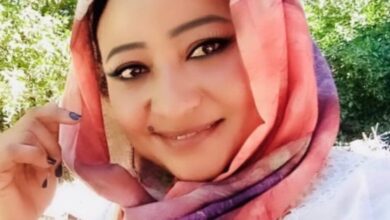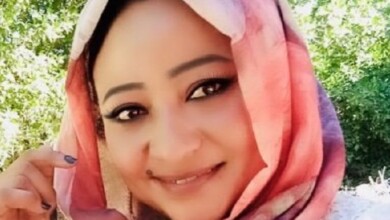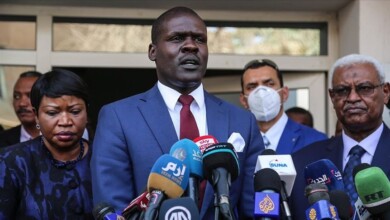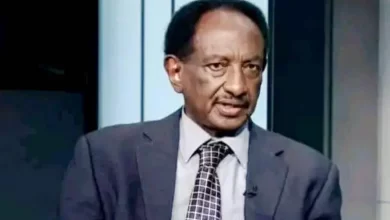Dar Masalit: When blood speaks and the State is silent
Dr. Al-Waleed Adam Madibou

“True justice isn’t limited to the law, but the conscience of humanity written on paper.”
Martin Luther King
In a country accustomed to writing its history in ink and blood, the events in El-Geneina stand out -not as an isolated crime, but as the tip of an iceberg of official complicity, moral failure, and social fragmentation. What Professor Bushra Ali recounted, from an eyewitness, not an emotional witness, isn’t merely a report of a massacre, rather, it reveals the reality of the deep-rooted Central State apparatus when it decided to transform cities into tribal battlefields.
In those dark days, the sky wasn’t only raining bullets, moreover, the last mask worn by the State fell as it transformed into a creator of strife, not a mediator of peace, cutting off communications, withdrawing tanks, arming one party, for the sole purpose of abandoning it to its fate, and then savoring its blood —the aforementioned weren’t random decisions, but rather an effort in (genocidal engineering), according to Bushra Ali’s term of choice. The Military Intelligence Division perfected this strategy, to the point where El-Geneina became a popular front to ignite a war amidst the marginalized and lift the siege on Khartoum by drawing the Rapid Support Forces (RSF) to Darfur. At such juncture, we ought to understand the Port Sudan government’s refusal to allow the UN Fact-Finding Mission to enter El-Geneina at the time and investigate the events in a transparent and impartial manner.
However, this crime, despite its enormity, was merely the end product of a larger, deeper, and more dangerous conflict: The conflict over Dar Masalit as an open stage for the “divide and conquer” policies implemented by the Center over decades. While violence flowed from the Sudanese Army camps and the Rapid Support Forces, division flowed from Party headquarters and the offices of the generals, all fueled by the illusion of hegemony over a territory that had never amounted to being anything more than a wound in the State’s side and a symbol of its structural failure.
The identity of Masalit has transformed from a historical narrative of an ancient kingdom that resisted colonialism into “leverage” in the hands of the Central elites, sometimes brandished against the Rapid Support Forces and other times used to ignite conflicts amongst the marginalized, perhaps in the name of revenge, or in the name of balance.
Between the detailed account recounted by the eyewitness and the structural scene we can blatantly note through the reality of Dar Masalit, it becomes clear that the solution won’t come from above —neither from the Palace hill nor from the division’s leadership— but from below: From the Native Administrations and the conscience of the local communities, which still retain some vitality in the midst of this bloody quagmire.
At the moment, what Darfur needs isn’t limited to a tribal reconciliation, but extends to encompass a comprehensive review of the political system that has produced this level of violence, and a redefinition of the Center of the State so that it isn’t at the expense of the marginalized. Arabism shouldn’t be pitted against Africanism, nor official Islam against popular Islam. Rather, the true State should be pitted against the false State that engineered the war and then stood on the hill of ashes, shedding crocodile tears.
Dar Masalit won’t be healed by human rights reports or fact-finding committees that fail to acquire visas. Rather, it will be healed by a lengthy process of justice, openness, accountability, and the establishment of a new national project, built -not- on the balance in regards to arms, but on the balance of morality and popular legitimacy.
Darfur doesn’t need geographic separation, but rather a moral separation from a past of collusion and betrayal. It doesn’t need a new republic, but a new awareness that establishes a State governed -not- by bloodshed, but by justice. Yes, the Rapid Support Forces bear legal and moral responsibility for a number of these violations. However, justice isn’t justice if its partial or directed with one eye. It’s unacceptable for the leadership of the Rapid Support Forces to be tried for the crimes of El-Geneina, while Al-Bashir and his cohorts are immune from prosecution, despite being wanted by international justice. No justice will be complete if administered by a public prosecutor who lacks moral and intellectual competence as well as the courage to extradite the leaders of the former regime for long-awaited trials.
Silence is treason, and neutrality is complicity. A State will not be built on the blood of innocents unless we break the cycle of impunity and bring all killers to justice, not for political reasons, but in the name of justice. Perhaps this blood will speak not of revenge, but of a final call: Pave a path out of the experienced tragedy, and a beginning out of the devastation.
The aforementioned won’t become a reality unless the elites emerge from the cloak of the Center, stop engineering the devastation to suit narrow goals, and join the masses of survivors and displaced persons, those who have nothing left but the memory of pain and the fodder for the story. Only then can Dar Masalit transform from a symbol of collapse into the beginning of a new consciousness that rewrites history in the language of justice and reconciliation, not in the language of denial and revenge.





